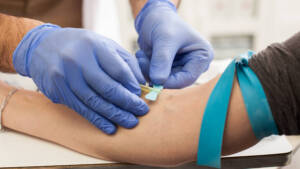I get bloodwork done every six months. I feel the healthiest every in my life. I’m back to running after years of injuries. My nutrition is solid. I take top-notch supplements. Yet, my latest blood test results indicated elevated liver enzymes.
How could this be? I hardly drink alcohol. I don’t take much medication (save for when I have a migraine coming on). I eat well. I exercise daily. What gives?
Doing some research and then talking with my doctor, I learned that it’s not uncommon for runners to have elevated liver enzymes as strenuous exercise can raise enzymes like AST and ALT. Other biomarkers can be impacted too by running, especially endurance running such as marathoning.
Related: Does Running Cause Imbalanced Hormones?

To get the most accurate blood test results, it’s important to fast but also not do any intense running within several days of your lab work. This is difficult to do when in the midst of a training cycle. I am always within 48 hours or less of a harder workout whether it be a track workout or a long run.
With that in mind, I did research to learn what blood markers can be impacted by our running so that we don’t freak out when numbers are without range and can ask our doctors the right questions. (This is not an exhaustive list).
In this article, I will cover the top 5 biomarkers affected by running and ways to improve your levels:
- Liver enzymes AST and ALT
- Cortisol
- Sodium
- Creatine Kinase
- Ferritin
Honestly, it would have been easy for me to see elevated liver enzymes and worry I have some sort of liver disease brewing. In fact, it’s important for your healthcare professional to know about your running habit in order to give you the best guidance for your health.
(By the way, the rest of my levels were pretty darn perfect despite running higher volume. I believe this is in large part to taking Previnex supplements, which I have written about a lot because they are top-notch and work. Save 15 percent with code TMR15.).
Another option is to use a company such as InsideTracker which gives athlete-specific biomarker ranges and advice on how to optimize your health. (If you are interested, message me for a discount on their tests).
Blood tests are helpful for runners because they help highlight biomarkers critical for performance that you may need to focus on and also make sure you not training too hard.
If you decide to get a blood test, for more accurate results:
- Time your blood test at least 2 days after from strenuous exercise
- Fast for 12 hours (black coffee is okay)
- Do not take supplements or OTC meds 24 hours before your blood draw
- Schedule your draw in the morning
- Be sure your doctor knows how much you run
- Ask for a full panel that includes hormone and ferritin levels
- Be sure to eat after your draw and before you exercise
- Avoid strenuous exercise the day of your blood draw
So let’s go!
Note: I am not a doctor, but I did do research to write this article. Always speak to your doctor about blood test results and any concerns you may have. The purpose of this article is help you know what to look for and what questions to ask, not diagnose anything!
Related: The 12 Best Supplements for Runners
Elevated Liver Enzymes in Runners
What are ALT and AST?

AST (alanine transaminase) and AST (aspartate transaminase) are liver enzymes that support detoxifying pathways and energy production.
When you run hard and damage your muscles, your liver responds by releasing ALT and AST to help clear away the toxins from the tissue damage. Runners can have elevated liver enzyme levels of AST and ALT for 7 or more days after strenuous exercise, including running and weightlifting.
For those in the midst of a marathon training cycle, it’s likely these liver enzymes may be elevated throughout the duration of the peak marathon training phase. However, chronically high ALT and AST liver enzymes may be a sign of over-training, or other health concerns.
Related: A Runner’s Guide to Strength Training
How can you lower ALT and AST?
If your liver enzymes are elevated, consider:
- Scaling back your training by at least 30 percent
- Taking a running break
- Incorporating more fiber, leafy greens, beans, coffee, and plant protein into your diet
- Asking your doctor about liver health supplements
Related: How to Tell if a Supplement is Good Quality
Elevated Cortisol Levels in Runners
What is cortisol?
Cortisol is a necessary stress hormone released by your adrenal glands in response to any type of stress—whether it’s a work deadline, screaming toddler, or tempo run.
Cortisol triggers what’s known as our fight-or-flight response, which raises our heartrate, blood pressure, and contracts muscles. Cortisol is also important for regulating blood sugar, repairing tissues, regulating blood pressure, maintain energy, regulating your sleep cycle, and reducing inflammation.
Cortisol is usually higher in the morning and lowers throughout the day to help us get ready for bedtime. Cortisol levels that remain chronically high are problematic for our health, and could be related to health issues including overtraining in runners, chronic fatigue, poor sleep, weight gain, high blood sugar, and reduced recovery.
How do you lower cortisol levels?
If you have chronically high cortisol, consider:
- Take a break from running.
- Optimizing your sleep. (I love the Lagoon Sleep pillows. They definitely help you sleep better. No exaggeration. Save 15 percent with code MOTHERRUNNERS.)
- Ask your doctor about adrenal support or ashwagandha supplements which have been shown to lower cortisol levels.
Related: Why You Should Take a Planned Running Break
Low Sodium in Runners
What is sodium?
Sodium is an electrolyte which are minerals essential to our body’s functions.
A runner friend of mine had blood test results with low sodium results. Her doctor panicked. However, the low sodium was due to her doing a long run in the heat the day before.
Indeed, we sweat a lot when we run and our muscles use electrolytes like sodium for essential functions and proper hydration.
Runners, especially runners who run long distances, need extra sodium to perform and stay healthy. Too little sodium can cause a condition caused hyponatremia, where you have too little sodium in your blood, and can be deadly.
Related: Hydration Guide + Sports Drinks Review
How do you treat low sodium?
If you have low sodium, you need to focus on drinking more electrolytes during your running. Consider an energy gel like Huma Gel+ that has more electrolytes or sipping on a sports drink during your runs.
If you have dangerously low levels, you may need intravenous fluids or medication. See a doctor.
Related: Do You Need Electrolytes in the Winter?
Elevated Creatine Kinase (CK) in Runners
What is creatine kinase?

Creatine kinase is a protein in our muscles used for making energy required for muscle contraction. When CK enters the blood, the kidneys get to work to break CK down and eliminate it.
Elevated CK is common runners, especially after big workouts as it is released when our muscles contract. CK levels in runners are usually 3 to 5 times higher than normal. Sometimes CK levels more than a hundred times a normal range can be seen after events such as a marathon.
Elevated CK levels can be a sign of serious conditions such as genetic disorders or diseases like Rhabdomyolis, so if your levels are very high—especially if you haven’t done a lot of long distance or intense running, then you should absolutely follow up with your doctor.
CK levels typically decrease by half within 36 hours of an endurance event. Therefore, if your CK levels are high more than a week after a marathon, for example, it could be a signal that you aren’t recovering well and need to double down on rest, hydration, and nutrition (and not resume training yet).
How can you lower CK levels?
If your CK levels are higher than normal, it could be a sign of overtraining. Consider:
- Optimizing your nutrition by fueling well before, during, and after your running
- Getting at least 7-9 hours of sleep a night
- Backing off on training or taking a break
- Talking to your doctor!
Related: 7 Tips to Recover Faster from a Marathon
Low Ferritin in Runners
What is ferritin?
Ferritin is a protein that stores iron and is an indicator of how much iron is in the body. Runners use iron to help shuttle oxygen to working muscles as iron helps form hemoglobin, a protein responsible for transporting oxygen.
Why do runners have low ferritin?
It’s not uncommon for runners to have low ferritin, especially female runners.

Runner’s lose iron when they run through sweat and urine, and when their feet strike the ground—breaking red blood cells. (I write more about low ferritin in runners here.) Menstruating female runners lose iron during their periods.
If you are running a lot in the summer heat, there is a good chance your ferritin will be low.
I’ve struggled with low ferritin for years. I finally got it up into the 40s, after being chronically in the teens for years.
Low ferritin and iron may be a sign of what’s called runner’s anemia, a reduction of iron in an athlete’s blood due to a higher volume of running. (Note: low iron is not synonymous with anemia. Anemia is when your red blood cell count is abnormally low. Low iron is when your iron is low, but your red blood cell count may not be affected.)
Runner’s anemia, or an iron deficiency or low ferritin, can hurt running performance because it hinders the ability of your body to move oxygen (your fuel) to your muscles. Low ferritin or iron can result in injury, increased illnesses, irritability, fatigue, hair loss, poor running and recovery, and increase heart rate, to name a few.
Related: 9 Reasons You Aren’t Getting Faster
How do you raise ferritin levels?
If you have low ferritin, there are several ways you can increase your ferritin levels:
- Eat more iron-rich foods like eggs, leafy greens, and meat.
- Couple iron with vitamin C to optimize absorption.
- Cook in a cast-iron pan.
- Talk to your doctor about an iron supplement, I finally got my ferritin up by doubling the dosage of Blood Builder.
- Try running in cooler temperatures.
Related: The Danger of Low Ferritin in Female Runners
If you want guidance with your run training, check out my run coaching services. Also, be sure to check out my free training plans:
- Postpartum Training Plan
- After a Break Training Plan
- 5k Training Plans
- 10k Training Plans
- Half Marathon Training Plans
- Marathon Training Plans
- Strength Training Plan
